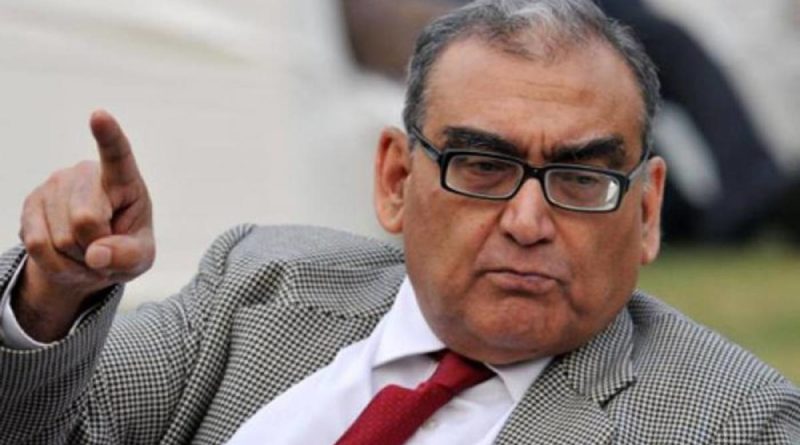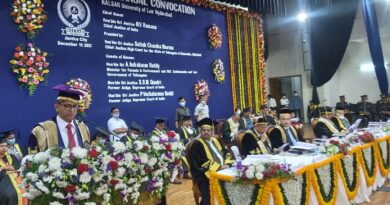The wolf is at your doorstep
By Justice Markandey Katju, former Judge, Supreme Court of India.
The Indian people remind me of Mir Saheb and Mirza Saheb, in Munshi Premchand’s story ‘ Shatranj ke khilaadi ‘, who were so engrossed in playing chess in Lucknow that they were oblivious to all that was going on around them, until the British army was at their doorstep.
I have been saying since long that some kind of French Revolution is coming in India, but I was mocked at, not taken seriously, and depicted as the boy who cried ‘wolf’. Well, the wolf is staring you at your doorstep now, and you cannot keep avoiding seeing its glare and behaving like an ostrich any more.
Consider the facts. On the one hand, all state institutions in India have become hollow and empty shells, and largely corrupt ( see my article ‘ Why celebrate Republic Day when our Constitution has become a scarecrow ‘ online ). On the other hand the economy has tanked, and is spirally rapidly downwards ( details about fall in GDP, auto sales, IT sector, etc, steep manufacturing decline, crash in the real estate market, lacs of job losses, etc, are available everywhere, and so I am not repeating them ).
Abolition of Articles 35A and 370 were to my mind only stunts and gimmicks, like Yoga Day, Swatchata Abhiyan, gau raksha, ghar wapasi, Ram Mandir, etc to divert people’s attention from the looming economic crisis, but one cannot keep bluffing with hard economic facts forever.
What in essence is the cause of this crisis? All economists admit it is due to lack in demand, and this is because most people in India are poor and have little purchasing power. We no doubt can increase production as we have thousands of engineers and technicians ( our IT engineers are manning Silicon Valley in California ), as well as immense natural resources. But how can the increased production be sold when most people are too poor to buy? So the solution to the problem is to raise the purchasing power of the masses, but that cannot be done within the present system.
In the Soviet Union the policy of rapid industrialisation came with the adoption of the First Five Year Plan in 1928. The methodology adopted was this : the government fixed prices of commodities, and kept reducing them by 5-10 % every 2 years or so. This enabled people to buy more goods with the same wage ( as real wage is relative to the price index ), and this led to steady expansion of the domestic market. Similtuneously production was rapidly stepped up, and this increased production could be sold in the domestic market as people now had more purchasing power. Also, this rapid industrialisation created millions of jobs, which solved the problem of unemployment. Thus the Soviet economy rapidly expanded at a time when the Great Depression, starting from the Wall Street Slump of 1929, was going on in America and Europe, resulting in closing down of thousands of factories and throwing millions of workers out of jobs.
In my opinion the same methodology alone can solve India’s economic crisis, but that will not be accepted in the system prevalent in India today. So the situation will keep getting worse.
We have the parliamentary system of democracy, but everyone knows it runs largely on the basis of caste and religious vote banks. Casteism and communalism are feudal forces which have to be destroyed if India is to progress, but parliamentary democracy further entrenches them. So it has to be replaced by an alternative system which enables India to rapidly induostrialise, since rapid industrialisation alone is the solution to our country’s problems, as it will generate the wealth required for providing for the welfare of our people and create millions of jobs.
The last Lok Sabha election was won on the Hindutva plank. But one can’t eat Hindutva, one must eat food, and to eat food one must have a job. But joblessness is at a 45 year high, as even the National Sample Survey admits, and the situation is getting worse.
The pace of history has speeded up in India. Those who were heroes only a few weeks back are rapidly becoming zeroes, as people wake up to harsh realities.
Presently people in India are in a state of shock due to the economic downturn, but this situation will not last long. 12 million youth are entering the job market in India every year, but jobs are getting less. Farmers distress continues unabated. This is bound to result in large scale popular agitations soon.
Merging banks, selling off Air India, taking money from the RBI etc cannot solve anything. A total historical transformation of the present political and social system is required, and now it can be seen appearing on the horizon, though no doubt it will be achieved only after a long popular struggle led by patriotic modern minded leaders, and tremendous turbulence and pain.




